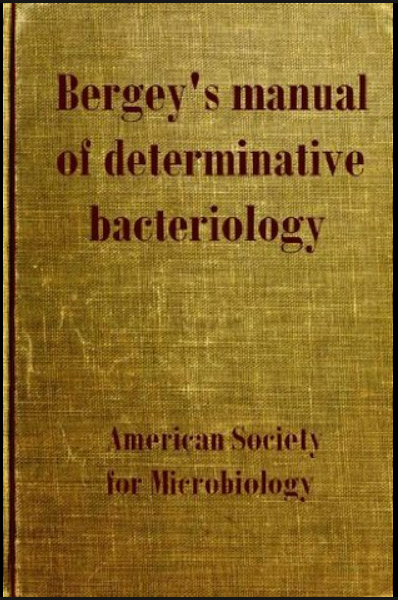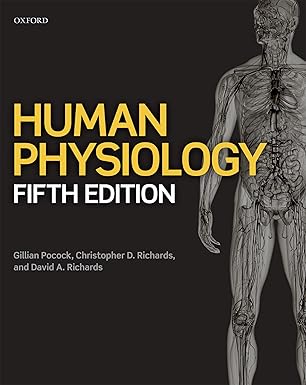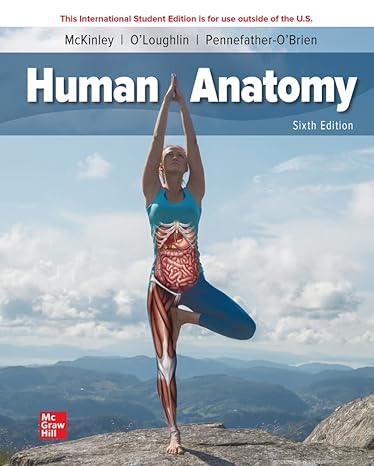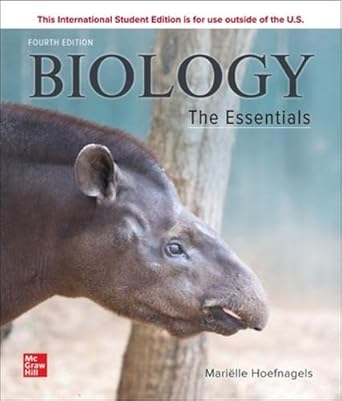The general format of the seventh edition of Bergey's Manual of Determinative
Bacteriology differs but Uttle from that of the sixth edition. However,
examination will reveal many changes in the content as the result of a
thoroughgoing revision. Among these the following seem to be worthy of special
comment.
The most obvious change is that of the separation into two volumes of the
material comparable to that which appeared in the sixth edition. The present
volume is entitled the seventh edition of Bergey's Manual of Determinative
Bacteriology. This Manual contains an outlined classification of the bacteria
and the descriptions of the taxa from Class to Species and Subspecies, together
with the appropriate keys. Nearly all species regarded as having been
inadequately described or that could not be definitely placed have been excluded,
together with many of the less important synonyms of the accepted species.
These, together with the index to all the literature of both accepted and poorly
described organisms have been transferred to a volume to be known as the
Index Bergeyana. The latter volume will include all descriptions and citations
to species formerly found as appendices or indefinitely placed as species incertae
sedis. The host and habitat index will also be found in the Index Bergeyana.
The net result is that the Manual itself contains descriptions of many more
species with more adequate descriptions than have former editions; the transfer
of much material to the Index Bergeyana has meant a reduction in the number
of pages and a book of more convenient size and greater usefulness. The Index
Bergeyana should prove to be an invaluable tool for the research microbiologist,
containing, as it will, references to the whole field of systematic bacteriology and
an index to the names of described species, both valid and invalid.
The keys to the several categories of taxa (orders, families, tribes, genera and
species) have been revised with a view to making them more reUable and useful.
There is included also an artificial key to the species prepared by Professor
V. B. D. Skerman, which key should prove helpful.
The Section on Nomenclature, including a synopsis of the Botanical Code of
Nomenclature, has been eliminated. At the time of preparation of the sixth
edition, the International Code of Bacteriological Nomenclature had not been
finally approved, and emphasis was properly laid upon the rules used in Botany.
This is no longer pertinent. The Bacteriological Code appeared in 1948 too late
for use in making appropriate revisions in the 6th Edition of the Manual. The
revised International Code of Nomenclature of the Bacteria and Viruses is about
to be published. This contains annotations that should prove of value to the
student, and should be regarded as a helpful aid in the understanding of the
nomenclature used in the 7th Edition of the Manual.
The naming and classification of the viruses, as published in the sixth edition
of the Manual, was regarded by some eminent virologists as perhaps inadvisable
because it was premature. They felt strongly that the problems of morphology,
physiology, pathogenesis and inter-relationships of the viruses were not as yet
sufficiently resolved to make satisfactory taxonomy and classification practicable.
After consultation with the International Subcommittee on Viruses it was decided
that the Virus Section should not be included in the seventh edition. This
deletion has been made with the full expectation that sufficient international
agreement will be reached to make possible adequate treatment in the eighth
edition. The Editorial Committee recognizes that a satisfactory system of
nomenclature and taxonomy for the viruses is imperative.
چکیده فارسی
قالب کلی ویرایش هفتم کتاب راهنمای تعیین کننده برگی
باکتری شناسی متفاوت است اما Uttle با نسخه ششم. با این حال،
بررسی تغییرات زیادی را در محتوا در نتیجه یک
نشان خواهد داد بازنگری کامل در این میان موارد زیر شایسته ویژه به نظر میرسند
نظر دهید.
واضح ترین تغییر، جداسازی به دو جلد
است مطالب قابل مقایسه با آنچه در ویرایش ششم ظاهر شد. حال
عنوان جلد هفتمین ویرایش کتاب تعیین کننده برگی است
باکتری شناسی. این راهنما شامل یک طبقه بندی کلی از باکتری ها است
و توضیحات گونه از کلاس تا گونه و زیرگونه، با هم
با کلیدهای مناسب تقریباً همه گونهها وجود دارند
توصیف ناکافی یا مواردی که نمی توان به طور قطعی در آن قرار داد حذف شده اند،
همراه با بسیاری از مترادف های کمتر مهم گونه های پذیرفته شده.
اینها همراه با نمایه تمام ادبیات هم پذیرفته شده و هم ضعیف
موجودات توصیف شده به حجمی به نام
منتقل شده اند شاخص برگیانا. جلد اخیر شامل تمام توضیحات و نقل قول ها می شود
به گونه هایی که قبلاً به عنوان ضمیمه یافت می شدند یا به طور نامحدود به عنوان گونه های incertae قرار می گرفتند
سدیس شاخص میزبان و زیستگاه نیز در Index Bergeyana یافت می شود.
نتیجه خالص این است که خود Manual شامل توضیحات بسیاری از موارد دیگر است
گونه هایی با توصیف های مناسب تر از نسخه های قبلی. انتقال
بسیاری از مواد به شاخص Bergeyana به معنای کاهش در تعداد است
از صفحات و کتابی با اندازه راحت تر و مفیدتر. شاخص
Bergeyana باید ثابت کند که ابزار ارزشمندی برای میکروبیولوژیست تحقیقاتی است،
حاوی ارجاعاتی به کل رشته باکتری شناسی سیستماتیک و
است نمایه ای برای نام گونه های توصیف شده، معتبر و نامعتبر.
کلیدهای چندین دسته از گونهها (دستهها، خانوادهها، قبیلهها، جنسها و
گونه ها) با هدف ایجاد قابلیت استفاده مجدد و مفیدتر مورد بازبینی قرار گرفته اند.
همچنین شامل یک کلید مصنوعی برای گونه است که توسط پروفسور
تهیه شده است V. B. D. Skerman، کدام کلید باید مفید باشد.
بخش نامگذاری، شامل خلاصه ای از کد گیاه شناسی
نامگذاری، حذف شده است. در زمان تهیه ششم
نسخه، کد بین المللی نامگذاری باکتریولوژیک وجود نداشت
در نهایت تصویب شد و به درستی بر قوانین مورد استفاده در گیاه شناسی تاکید شد.
این دیگر ربطی ندارد. کد باکتریولوژیک در سال 1948 خیلی دیر ظاهر شد
برای استفاده در اصلاحات مناسب در ویرایش ششم کتابچه راهنمای.
کد بین المللی اصلاح شده نامگذاری باکتری ها و ویروس ها در مورد
است منتشر شود. این شامل حاشیه نویسی است که باید برای
ارزش داشته باشد دانش آموز، و باید به عنوان یک کمک مفید در درک
در نظر گرفته شود نامگذاری استفاده شده در ویرایش هفتم راهنما.
نامگذاری و طبقه بندی ویروس ها، همانطور که در ویرایش ششم منتشر شده است
برخی از ویروس شناسان برجسته این راهنما را شاید غیر قابل توصیه دانستند
چون زودرس بود آنها به شدت احساس کردند که مشکلات مورفولوژی،
فیزیولوژی، پاتوژنز و روابط متقابل ویروس ها هنوز وجود نداشت
به اندازه کافی حل شده است تا طبقه بندی و طبقه بندی رضایت بخش را عملی کند.
پس از مشورت با کمیته فرعی بین المللی ویروس ها تصمیم گرفته شد
که بخش ویروس نباید در ویرایش هفتم گنجانده شود. این
حذف با این انتظار انجام شده است که بین المللی کافی
باشد برای امکان درمان کافی در هشتم
توافق حاصل خواهد شد نسخه. کمیته تحریریه تشخیص می دهد که یک سیستم رضایت بخش
نامگذاری و طبقه بندی برای ویروس ها ضروری است.
ادامه ...
بستن ...
Rhizobium 285
Andrewes, C. H. Virales 985
Barker, H. Albert Methanococcus 473
Butyrihacterium 577
Zymobacterium 577
Beger, H. Caulobacteraceae 212
Siderocapsaceae 217
Chlamydobacteriales 262
Bier, Otto Calymmatobacterium 418
Borman, E. K. Paracolobactrum 346
Branham, Sara E. Neisseria 480
Breed, R. S.f Introduction 1
Considerations influencing the classification 4
Methanomonadaceae 74
Thiobaderiaceae 78
Pholobacterium 193
Protaminobacter 200
Mycoplana 204
Caulobacteraceae 212
Siderocapsaceae 217
Vibrio 229
Methanobacterium 250
Cellvibrio 250
Cellfalcicula 252
Spirillum 253
Chlamydobacteriales 262
Chromobacterium 292
Alcaligenes 297
Achromobacter 300
Flavobacterium 309
Agarbacterium 322
Enterobacteriaceae 332
Escherichia 335
Aerobacter 341
Klebsiella 344
Serratia 359
Pasteurella 395
Bacteroidaceae 423
Sphaerophorus 441
Micrococcaceae 454
Micrococcus 455
Sarcina 467
Brevibacteriaceae 490
Coryneb acteriaceae 578
Caryophanales 830
Virales 985
Numerous contributions to various other taxa
Broom, J. C. Leptospira 907
t Deceased.
Buchanan, R. E.
Burkholder, Walter H.
Campbell, L. Leon, Jr.
Clark, F. A.
Clise, Eleanore H.
Conn, H. J.
Couch, John N.
Davis, Gordon E.
Delwiche, Eugene A.
Doetsch, R. N.
Douglas, H. C.
Dumas, Julien
Elazari-Volcani, Benjamin
Eltinge, Ethel
Evans, James B.
Freundt, E. A.
Gordon, Ruth
Hanks, John H.
Hansen, Paul Arne
Haupt, Herbert
Haynes, William C.
Kitchens, A. Parkerf
Hofer, A. W.
Hoffman, Heiner
Holmes, Francis O.
Honigberg, B. M.
Hucker, George J.
Huddleson, I. F.
Janke, Alexander
LIST OF CONTRIBUTORS
How Bacteria are Named and Identified 15
Paraspirilluni 257
Beggiatoales 837
Beggiatoaceae 837
Leucotrichaceae 850
Pseudomonas 89
Xanthomonas 152
Agrobacterium 288
Erwinia 349
Corynebacterium 579
Beneckea 328
Cellulomonas 601
Pasteurella 395
Eubacterium 552
Catenabacterium 560
Ramibacterium 563
Cillobacterium 566
Agrobacterium 288
Alcaligenes 297
Actinomycetales 694
Actinoplanaceae 825
Spirochaetales 892
Propionibacteriaceae 569
Microbacterium 600
Hyphomicrobiales 276
Peptococcus 474
Shigella 384
Halubacterium 207
Chromobaclerium 292
Staphylococcus 464
Streptobacillus 451
Mycoplasmatales 914
Bacillus 613
Mycobacterium 695
Mycobacterium 695
Erysipelothrix 599
Actinobacillus 414
Pseudomonas 89
Dialister 440
Azotomonas 198
Azotobacteraceae 283
Fusobacterium 436
Sphaerophorus 441
Virales 985
Parasites of protozoa 927
Micrococcus 455
Gaffkya 466
Leuconostoc 531
Brucella 404
Thiobacteriaceae 78
Thiobacterium 79
Macromonas 80
Thiovulum 81
Thiospira 82
Salmonella 368
Noguchia 421
Bacteroides 424
Parasites of protozoa 927
Zymomonas 199
Erysipelothrix 599
Ferrohacillus 227
Photobacterium 193
Selenomonas 258
Myconostoc 260
Pasteurella 395
Euhacterium 552
Catenabacterium 560
Ramibacterium 563
Vilreoscillaceae 844
Arthrobacter 605
Clostridium 634
Clostridium 634
Pasteurella 395
Vibrio 229
Corynebacterium 579
Enterobacteriaceae 332
Moraxella 419
Bacteroidaceae 423
Neisseria 480
Lactobacillaceae 505
Diplococcus 507
Corynebacterium 579
Listeria 597
Anaplasma 981
Mycococcus 707
Lactobacillaceae 505
Streptococcus 508
Microcyclus 253
Thiobacillus 83
Lactobacillaceae 505
Pediococcus 529
Leuconostoc 531
Lactobacillus 542
Neisseria 480
Veillonella 485
Caryophanales 830
Microtatobiotes 931 and 933
Rickettsiales 934
Anaplasmataceae 980
Bordetella 402
Haemophilus 406
Vilreoscillaceae 844
Rake, Geoffrey W.
Reed, Guilford B.f
Robinson, Elliott S.
Robinson, George H.f
Schatz, Albert
Seeley, H. W.
Seeliger, H.
Sherman, James W.f
Skerman, V. B. D.
Smit, Jan
Smith, Louis DeSpain
Smith, N. R.
Snieszko, S. F.
Spray, R. S.
Stanier, R. Y.
Starkey, R. L.
Steinhaus, E. A.
Stuart, C. A.
Temple, Kenneth L.
Thj0tta, Th.t
Tobie, W. C.
van Niel, C. B.
Vaughn, Reese
Verona, Onorato
Waksman, S. A.
Wattie, Elsie (Mrs.
Lackey)
Weeks, Owen B.
Weinman, David
Wolff, J. W.
Yale, N. W.
ZoBell, Claude E.
Chlamydiaceae 957
Mycobacterium 695
Diplococcus 507
Spirochaetales 892
Hydrogenomonas facilis 76
Streptococcus 508
Corynebacterium 579
Lactobacillaceae 505
Streptococcus 508
Artificial Keys 987
Sarcina 467
Lactobacillaceae 505
Peptostreptococcus 533
Bacteroidaceae 423
Bacillus 613
Aeromonas 189
Clostridium 634
Myxobacterales 854
Nitrobacteraceae 68
Virales 985
Proteus 364
Thiobacillus 83
Alginornonas 202
Alginobacter 348
Chromobacterium 292
Rhodobacteriineae 35
Propionibacterium 569
Achromatiaceae 851
Acetobacter 183
Cellvibrio 250
Actinomycetales 694
Mycococcus 707
Actinomycetaceae 713
Streptomycetaceae 744
Zoogloea 206
Spirochaetales 892
Flavobacterium 309
Bartonellaceae 968
Leptospira 907
Escherichia 335
Aerobacter 341
Desulfovibrio 248
ادامه ...
بستن ...










